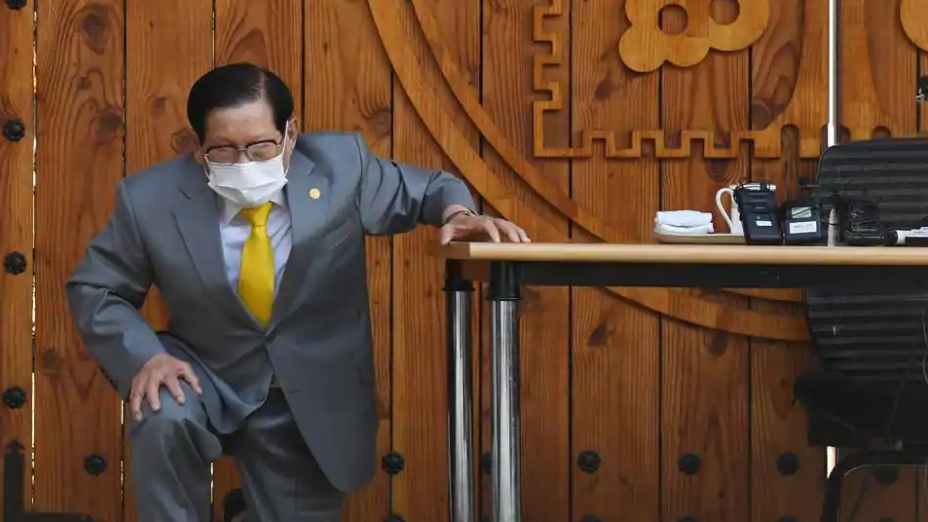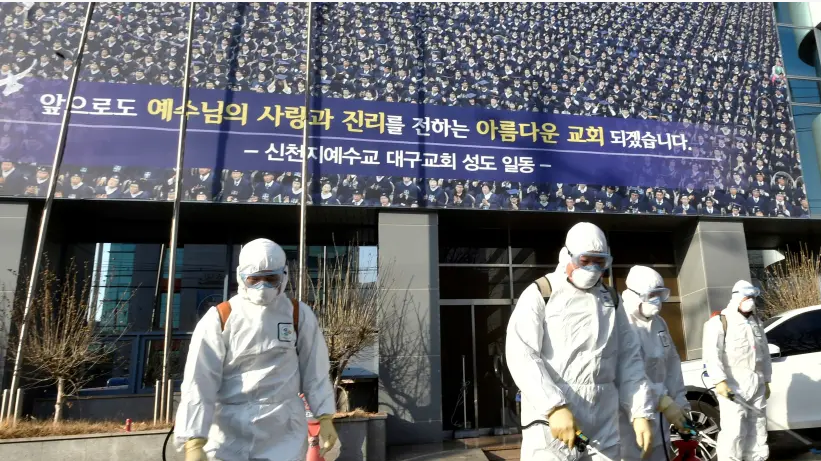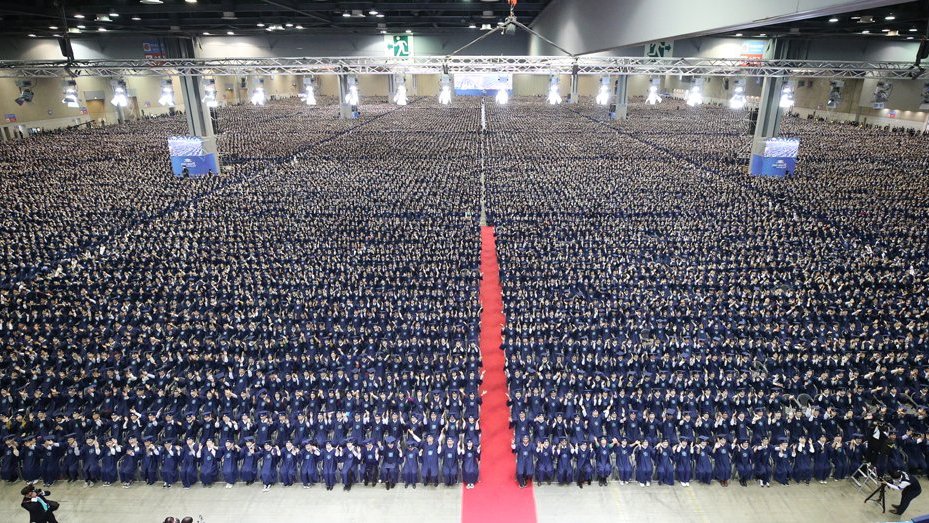
Lee Man-hee, founder and leader of the Shincheonji Church of Jesus (SCJ), apologizes. / Reuters
Lee Man-hee, founder and leader of the Shincheonji Church of Jesus (SCJ), apologizes. / Reuters
On his knees and amid screams of insults and slogans demanding that he takes responsibility. That's how Lee Man-hee, founder and leader of the Shincheonji Church of Jesus (SCJ), Temple of the Tabernacle of the Testimony, presented himself on Monday afternoon. In a press conference, 60 km away from South Korea's capital Seoul, he apologized for the spread of the novel coronavirus in the country.
The church became the focal point of the virus outbreak in the country and Daegu, located 300km southeast of Seoul, the biggest cluster of mass infection in South Korea. As of Wednesday morning, about 60 percent of the total number of coronavirus infections in the country - 5,328 - were connected to Shincheonji church in Daegu, reported Yonhap.
And there is no sign that the outbreak is slowing down as Korean health authorities have begun testing about 310,000 members of Shincheonji, so more cases are to be expected. Lee tested negative for the virus.
All points connect to patient 31, a 61-year-old woman that visited the Daegu sect's church four times before and after having symptoms of the disease, and that for two weeks met over 1,000 church followers. In the beginning, part of the cases was connected to the church itself and the other to a hospital near Daegu where a funeral for the brother of Lee Man-hee was held.
The group has been at the center of attention also because of the way it dealt with the outbreak. It has been accused of withholding information, being secretive and obstructing investigations. Seoul Metropolitan Government filed a suit against Lee and other church leaders on charges of homicide and inflicting injury.
The municipal government of Daegu did the same, alleging the hindrance of government-led disease-control efforts by providing false information. The group is also suspected of providing inaccurate lists of its followers, which would constitute obstruction of authorities, according to the city, cited by Yonhap.

Workers from a disinfection service company sanitize a street in front of a branch of the Shincheonji Church where a woman known as "Patient 31" attended a service in Daegu, South Korea, February 19, 2020./ Yonhap via Reuters
Workers from a disinfection service company sanitize a street in front of a branch of the Shincheonji Church where a woman known as "Patient 31" attended a service in Daegu, South Korea, February 19, 2020./ Yonhap via Reuters
Risky public health practices
Its practices have also been put in question. To CGTN Digital, Ji-il Tark, professor of Church History at Busan Presbyterian University, explained that members sit very close together on the floor for long periods. This increases infection risks.
Besides, to CNN a former member said followers were not allowed to wear masks in services because it's "disrespectful to God." This claim was denied by SCJ director of international missions, who said that since January members with symptoms had been told not to come in, or to wear masks.
Tark added that Shincheonji members usually have dual membership; one as an active member to SCJ, and another for going undercover within other churches to recruit members.
Along with the fact that members are encouraged to hide or deny their part in the group, even to their families, it creates a web of disease transmission in the community.
The plot thickened when one of the infected followers happened to be the head of the Infection Preventive Medicine Department, in the western district of Daegu.
The fact that the Christian Council of Korea considered Shincheonji a "heretic cult" that deceives its converts has been used as an explanation for why members hide their beliefs. But in general, the church is considered a new religious movement.
Religious to political influence
Tark notes that South Korea has undergone several difficult socio-political situations, such as the Japanese occupation, the Korean War and military dictatorship. "This well provided fertile soil for the growth of cults. Cults usually try to have more influence, so they try to come closer to politicians," he said.
On what attracts hundreds of thousands of people to different religions in the country, the professor explained that they focus on creating "close personal relationships" and then teach their doctrine. With so many available, "recent cults try to do good work to show to society" that they are good neighbors.
In the professor's opinion, "since Korea has a multi-religious background, cults are regarded as a normal religion. But there is always a possibility [of causing] serious social problems" due to the power they hold through their members.
Jun Kwang-hoon is another religious leader that shows how much can religion mix with politics in the country. On the conservatise side and leading a wave of criticism against President Moon Jae-in, he organized an anti-government rally at the end of February, defying a ban against large gatherings.
To the crowd, he said, "God will treat us and save us from the deadly disease." After that, he was arrested and stands accused of violating the election law that prohibits pre-election campaigning in favor of certain political parties or candidates.

Shincheonji held a graduation with 100,000 graduates on November 10 2019./ Shincheonji website
Shincheonji held a graduation with 100,000 graduates on November 10 2019./ Shincheonji website
The church
SCJ believes that the Promised Pastor "is creating God's kingdom of heaven here on earth, exactly as he witnessed it in heaven" and Lee Man-hee is that pastor.
"SCJ worship its leader Lee Man-hee and believes that he will live forever, never die. They believe, if their membership reaches to 144,000, all SCJ members will live eternally and will be kings ruling the world," explained Tark.
The sect, founded in 1984 by Lee, expanded inside and outside the country. The "Zion Christian Mission Center" recruits internationally through 300 centers in 15 countries, says the website. In China, there are seven churches and Wuhan, the center of the coronavirus outbreak was planned to have one too, but the group said it doesn't have a gathering place there.
At an Open Bible Seminar in December, SCJ said it has "grown explosively by producing 20,000-30,000 graduates annually," in the last five years. During that time, the two main Presbyterian churches in South Korea lost followers.
SCJ requires members to complete an eight-month Bible study course and a 300-question graduation exam with a strict minimum mark of 90 percent. These entry requirements aim "to create Bible-centered believers.”
Controversies
In August 2019, Newshub wrote that there were rising concerns about SCJ recruitment activity at universities in Auckland, Wellington, and Otago in New Zealand.
Aggressive recruitment put the universities on alert, and there were specific concerns regarding international students.
In one of those cases, a Christian student from the Philippines told Australia's Meld Magazine how she got recruited for a bible study and gradually became a member. She was isolated and her initial beliefs discredited and rebuilt in their view. When the church began to take up all of her life, and she wanted to leave, she faced depression and fear.
On another level, the UN's Humans Rights Council presented a statement in June 2019 focused on the "forcible deprogramming of members of Shincheonji." In it, it's argued that South Korea is one of the few countries in the world in which deprogramming from brainwashing still occurs and SCJ members are the most frequent victims of it. Since 2003, were reported 1,287 deprogrammings, two of which resulted in death.